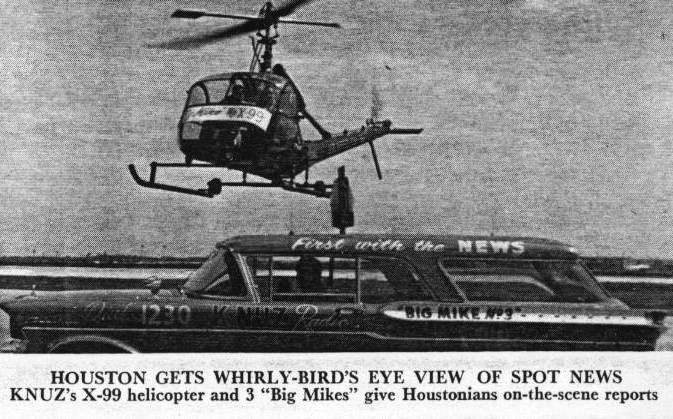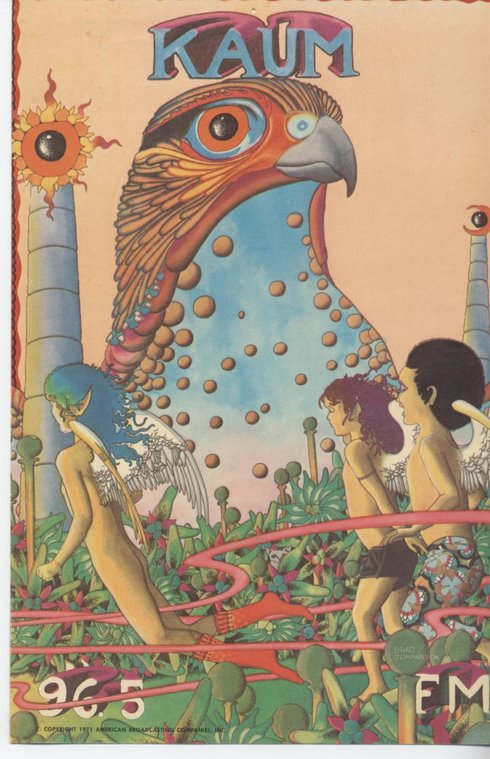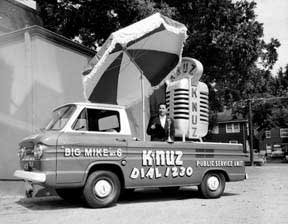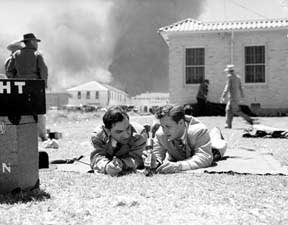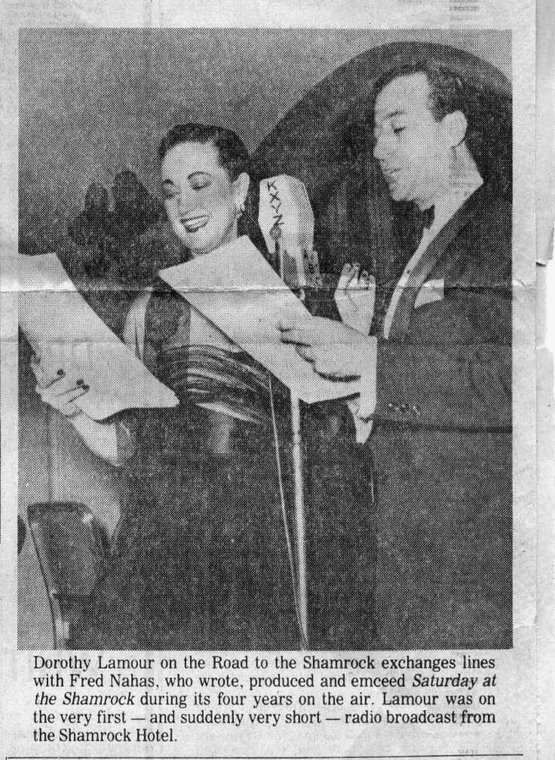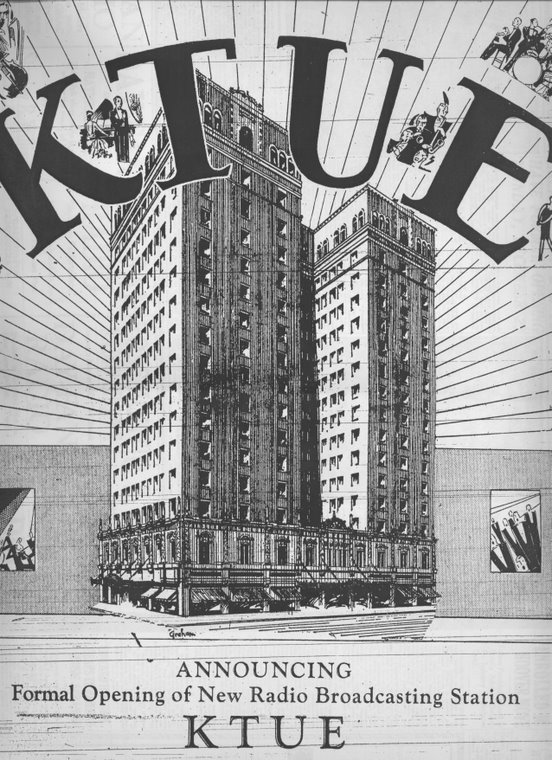It is not clear when this station finally got on the air. On the 4th of December the FCC accepted for filing an application to approve the antenna at a location on Bayou Road, 1.7 miles from the center of Goose Creek, and to specify the studio location in the M. Wilkenfield Building at 106 Goose Str. in Goose Creek.
White's Radio Log for Winter/Spring 1947, covering January, February and March, does not list the station but the
Texas Almanac for 1947-48 includes
KRCT as one of 94 radio stations operating as of April 15, 1947. The earliest mention I have found in the Goose Creek
Daily Sun was on p. 2, June 24, 1947, of a radio address on the issue of school consolidation to be aired on the station.
The Sun was trying to get it’s own competing radio station on the air and seemed to have ignored the existence of
KRCT except in paid advertisements or news stories such as when the station’s 200' tower on Cedar Bayou was knocked down by a strong norther blowing in on November 7, 1947. That story received mention also in the Corpus Christi
Caller-Times and Mexia
Daily News as severe weather had wreaked havoc across much of Texas and Louisiana. (The station was back on the air the next day with a temporary antenna).
Other papers, however, provide earlier dates. On February 27, the Liberty
Vindicator, published in nearby Liberty, ran a story about a Baptist revival and stated one of the sermons would be broadcast over
KRCT on March 9 at 2:30 pm. There were other mentions in the
Vindicator and the Freeport
Facts in April and May indicating the station was on the air. The best guess is that
KRCT got on the air sometime between late December, 1946, and mid-February, 1947.
Leroy Gloger became part owner of the station in late 1957. The station moved to Pasadena that year and in 1961 established studios in the Montagu hotel in downtown Houston and flipped the call letters to
KIKK.
Roy Lemons, who was a Station Manager and Sales Manager for
KIKK in the 60s, e-mailed me to report the original call letters
KRCT came from the initials of Robert C. Touchstone, a furniture dealer in Goose Creek, who was one of the owners. He does not know when the station signed on or changed hands but says Gloger was the owner of a service station in Baytown when he bought the station for $110,000 with a $20,000 cash down payment. Roy has also provided information about the choice of the
KIKK calls and the famous boots logo which will be included later in this chronology.
ETA: Before the station got on the air an amended application was filed to move the studio location from the Wilkenfield building downtown to the transmitter site, described as the intersection Texas Avenue and Bayou Road or as 202 Bayou Road by the paper. There is a 1957 Historic Aerial showing the facilities, just NE of the intersection of Wright Blvd. and Bayou Drive as it is now known. The site does not allow links to specific images;
go to the site and use the search parameters 'bayou drive baytown texas' and select the 1957 aerial. Turn on the 'All Roads' overlay to identify Bayou Drive and Wright. If you click on the 1964 aerial you will see that after the station relocated to Pasadena and went on
KXYZ's main tower on Texas 225, the original
KRCT facilities had been demolished and if you click on the 2004 aerial you can see what's there now - it is an upscale residential neighborhood.
More details on the history of
KRCT and
KIKK can be found
here or by clicking on the labels below.
In its story on the
KRCT action the
Chronicle also reported Robert Matherne, owner of the
Daily Sun at Goose Creek, had applied for a permit to operate a 1000 watt station on 1360 kc. Besides the principles of the
Sun, the principles of Tri-Cities Broadcasting included I.G. Sanders, manager of the Culpepper’s Department Store in Goose Creek and Robert Strickland, an attorney. The call letters requested were
KREL, because Robert E. Lee High School ‘had been and would continue to be an important part of life in the Tri-Cities.’ The go-ahead was given by the FCC on May 1, 1947.
The Handbook of Texas says that in 1942, Felix Hessbrook Morales first applied for a license for a radio station in Pasadena. Morales, a native of New Braunfels, had produced his own radio programs on a San Antonio station before moving to Houston and had bought time for Spanish language programming on
KXYZ. Due to the war, Morales’ application was delayed for four years.
The Houston Press reported on November 2, 1946, that Felix Morales of 2901 Canal had applied to the FCC for a 1000 watt daytime station on 850 kc, with the programming to be 80% Spanish and 20% English; there were said to be 40,000 Spanish speaking residents of Houston. Morales was finally to get a station on the air May 5, 1950 with a celebration of Cinco de Mayo.
KLVL, “La Voz Latino,” 1480 kc, was licensed to Pasadena and is still on the air at that frequency with those calls, the third oldest radio station in Houston with the original calls. Read more about Morales and
KLVL here.
According to the
Broadcasting Yearbook,
KGBC,

Galveston, came on the air at 1540 kc in May, 1947, but the actual first air date was Saturday, February 1. A CP had been granted in August, 1946. James W. Bradner, Jr., was president of Galveston Broadcasting Co.; he had been an engineer with the TVA, with the national war housing administration during the war and City Manager of Waco. The station was only a daytimer at first and was promoted as Galveston’s only 1000 watt clear channel station. It is still on the air on the original frequency with the original calls.
According to
Broadcasting Yearbook,
KWHI Brenham, signed on April 15, 1947, on 1280 kc. It was owned by the
Brenham Banner Press but the archives of that paper are not available. The earliest mention in print was an ad in the Bryan Eagle on May 9 and the first mention of the station in the Houston
Post was on May 11. For more on the history of
KWHI and it's sister FM, go
here.
As far as I can tell it is the second oldest station in south east Texas outside of the Houston/Galveston or Beaumont/Port Arthur/Orange markets (
WTAW, Bryan-College Station is the oldest).
The image above is from the archives of the Galveston Daily News at the Rosenberg Library, Galveston.




